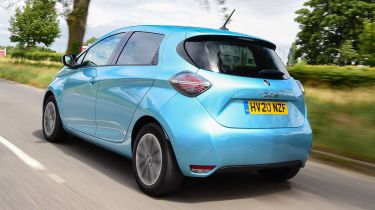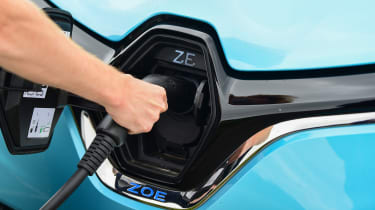Renault Zoe (2013-2024) - Range, charging and running costs
A 245-mile range and solid residual values help to boost the Zoe's appeal, though sub-par rapid charging speeds shouldn’t be overlooked

This is an archived review of the 2013-2024 Renault Zoe. If you are interested in information about a used Renault Zoe, or news about the latest Renault models, please follow the links provided.
You used to have to lease the battery in the Zoe, the main reason being that battery leasing helped lower the initial purchase price of the car and ensure it was as close as possible to that of an equivalent diesel car. However, times have changed and enhanced residual values of electric vehicles caused Renault to simplify things for customers. Now the battery is included in the price of the electric supermini, like it is with any other EV.
Every Zoe features a 52kWh battery and offers a maximum range of 239 miles based on the WLTP test cycle, or 223 miles if you go for the 17-inch wheels. For context, that blows the pants off zero-emissions city cars like the MINI Electric and Honda e which can only cover around 100 miles on a full charge, while the Peugeot e-208 and Vauxhall Corsa Electric will run out of juice after about 220 miles on the road. The MG4 EV in Long Range form pips the Zoe, however, with its range of up to 281 miles.
Used - available now

2021 SEAT
Ibiza
25,933 milesManualPetrol1.0L
Cash £14,499
2023 Audi
A1 Sportback
21,137 milesManualPetrol1.0L
Cash £16,690
2022 Volkswagen
ID.4
40,867 milesAutomaticElectric
Cash £16,994
2022 Peugeot
3008
62,532 milesManualDiesel1.5L
Cash £15,559It's worth noting that, like with all electric cars, the Zoe will struggle to achieve close to its maximum range in colder temperatures and with the use of power-sapping features in the car such as the climate control. Renault itself acknowledges that, in colder winter months, the battery range could be just 150 miles on average.
Charging at home is simple, with a 7.4kW wallbox capable of fully replenishing the Zoe’s 52kWh battery in nine and a half hours. You can get a three-pin cable for plugging into a standard socket at home, but it’ll take 32 hours to fill up from zero to 100 per cent capacity this way, so it’s really only a last resort for when you’re away from home and running desperately low on charge.
We’re more disappointed by the Zoe’s rapid charging capabilities, or lack thereof. The entry-level Zoe can only charge at up to 22kW, while those equipped with the upgraded R135 Boost Charge set-up get a CCS charging port in their nose and can reach 50kW. That’s still well behind the 100kW or more the e-208, Corsa Electric and MG4 will charge at.
As a result, it’ll take you close to an hour to charge the Zoe from 10 to 80 per cent capacity using a 50kW rapid charger, while the MG4 can take advantage of the UK’s growing number of ultra-rapid chargers and do the same 10 to 80 per cent top-up in half an hour. Something definitely worth bearing in mind if you do even the occasional long journey.
Insurance groups
Insurance groups for the Zoe start at group 18 for the base R135 Techno and R135 Boost Charge Techno, and move up to group 19 for the R135 Boost Charge Iconic. The costs are kept down partly because of the Zoe’s modest performance, and partly because the mileage expectations are so low.
Check if your car needs an MoT and view its complete history with our MoT History Checker...
Depreciation
Expert data suggests the Zoe will retain between 45 and 52 per cent of its original value over three years and 36,000 miles. This is a marked improvement over the previous model and should provide increased confidence for private buyers.
Check out our Free Car Valuation tool for an up to date price.









